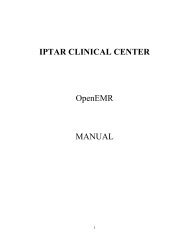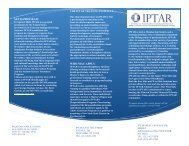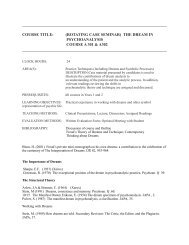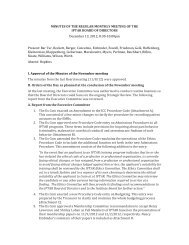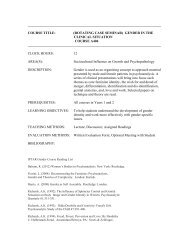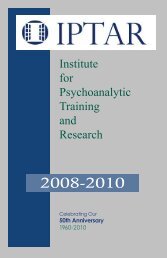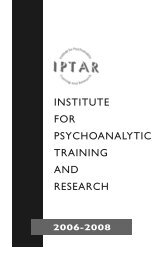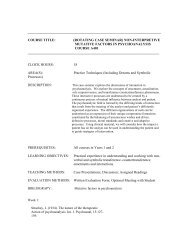IPTAR Bulletin - Institute for Psychoanalytic Training and Research
IPTAR Bulletin - Institute for Psychoanalytic Training and Research
IPTAR Bulletin - Institute for Psychoanalytic Training and Research
Create successful ePaper yourself
Turn your PDF publications into a flip-book with our unique Google optimized e-Paper software.
THE <strong>IPTAR</strong> TRAINING INSTITUTE<br />
A Contemporary Approach to <strong>Psychoanalytic</strong> <strong>Training</strong><br />
Our educational premise at <strong>IPTAR</strong> is that a psychoanalytic education is the<br />
basis <strong>for</strong> all therapeutic endeavors, providing an underst<strong>and</strong>ing of human<br />
character as well as a framework <strong>for</strong> comprehending the inter-relationships<br />
among human development, psychopathology, <strong>and</strong> the technique of treatment.<br />
<strong>Psychoanalytic</strong> underst<strong>and</strong>ing not only prepares an individual to conduct<br />
psychoanalysis, it also constitutes a basis <strong>for</strong> conducting psychoanalytic<br />
psychotherapy. A psychoanalytic foundation enables a therapist to choose<br />
the appropriate treatment modality <strong>and</strong> maximize an individual’s potential<br />
<strong>for</strong> growth.<br />
<strong>IPTAR</strong>’s training program comprises the three components of traditional psychoanalytic<br />
education:an intensive curriculum of courses <strong>and</strong> seminars on theory <strong>and</strong><br />
technique, a personal training analysis, <strong>and</strong> supervised psychoanalytic practice.<br />
WHO MAY APPLY<br />
<strong>IPTAR</strong> is an interdisciplinary <strong>Institute</strong> offering training to those in the mental<br />
health professions who have at least a Master’s Degree in their field of professional<br />
training <strong>and</strong> are either licensed or enrolled in a program leading to<br />
licensure.<br />
<strong>IPTAR</strong> is also committed to offering training to qualified individuals with<br />
backgrounds in the humanities, the social sciences, <strong>and</strong> the arts. These<br />
individuals must have at least a Master’s Degree <strong>and</strong> should first apply to<br />
<strong>IPTAR</strong>’s Respecialization Program (see page 38). Once having completed the<br />
Respecialization program, individuals are invited to apply to the New York<br />
State License Eligible Program in Psychoanalysis.<br />
NEWYORK STATE LICENSE ELIGIBLE<br />
PROGRAM IN PSYCHOANALYSIS<br />
<strong>IPTAR</strong> offers an additional pathway towards becoming a psychoanalyst. <strong>IPTAR</strong><br />
has always had a tradition of training individuals who are interested in psychoanalysis<br />
even if they do not have a mental health background.All individuals<br />
who have at least a Master’s Degree in another academic field may study<br />
at <strong>IPTAR</strong> <strong>and</strong> complete the NewYork State License Eligible Program in Psychoanalysis.<br />
Coursework <strong>for</strong> this program includes <strong>IPTAR</strong>’s Adult <strong>Psychoanalytic</strong><br />
Program with additional courses in Child Abuse Identification, <strong>Research</strong><br />
in Psychotherapy,<strong>and</strong> Ethics. Upon completion of the NewYork State License<br />
6<br />
SECTION I<br />
Eligible Program, individuals sit <strong>for</strong> the state examination in psychoanalysis,<br />
<strong>and</strong> upon passing the exam become licensed as a Psychoanalyst (LP).<br />
SEVIS PROGRAM<br />
In April of 2008, <strong>IPTAR</strong> was granted permission by the United States (U.S.)<br />
government to train non-immigrant <strong>for</strong>eign students. <strong>IPTAR</strong> established this<br />
program in response to requests from students <strong>and</strong> therapists in <strong>for</strong>eign<br />
countries who wished to obtain the kind of advanced training offered by<br />
<strong>IPTAR</strong> but were unable to do so in their native country. We believe that the<br />
presence of non-immigrant <strong>for</strong>eign students in our midst enhances our community's<br />
knowledge <strong>and</strong> awareness of the world beyond our own borders,<br />
<strong>and</strong> that non-immigrant <strong>for</strong>eign students would bring with them language<br />
skills <strong>and</strong> cultural knowledge that would help us more effectively treat the<br />
diverse community of patients encountered in the <strong>IPTAR</strong> Clinical Center <strong>and</strong><br />
its various community outreach programs,such as the On-Site School Program<br />
<strong>and</strong> the Asylum-Seekers Treatment Program.<br />
Citizens of <strong>for</strong>eign countries who wish to study at <strong>IPTAR</strong> should apply <strong>for</strong><br />
admission to the specific <strong>IPTAR</strong> program they are interested in. Non-immigrant<br />
<strong>for</strong>eign students who are accepted by <strong>IPTAR</strong> will be issued an official U.S.<br />
government <strong>for</strong>m, the I-20, which they can then take to the U.S. Embassy or<br />
consulate office in their own country in order to apply <strong>for</strong> an F-1 visa. It is the<br />
F-1 visa that allows the student to legally enter the U.S. in order to pursue a<br />
designated course of study.<br />
Prospective students who desire more detailed in<strong>for</strong>mation about acquiring an<br />
F-1 visa to study at <strong>IPTAR</strong> should contact our office at 212-427-7070 or our Foreign<br />
Student Advisor, Dr. Brett Gorkin, at 212-765-7961 or bdgpsych@aol.com.<br />
THE CURRICULUM<br />
The <strong>IPTAR</strong> curriculum embodies a contemporary Freudian perspective integrating<br />
developments in British object relations theories, modern Kleinian<br />
theory, attachment theory, <strong>and</strong> theories of the self. Its roots are in Freud’s<br />
groundbreaking contributions to the underst<strong>and</strong>ing of the human psyche.<br />
The following pages describe the <strong>IPTAR</strong> curriculum—a coordinated, four-year<br />
sequence of courses. The courses are eight weeks in duration unless otherwise<br />
specified. An additional group of elective seminars on current issues in psychoanalysis<br />
is offered in the Beyond the Basic Curriculum program (see page 19).<br />
In addition to the core curriculum,workshops <strong>and</strong> seminars on a wide variety of<br />
clinical topics are offered by the <strong>IPTAR</strong> Clinical Center (ICC) (see pages 45-46),<br />
<strong>and</strong> clinical-research seminars, in conjunction with ongoing research projects,<br />
are offered in the <strong>IPTAR</strong> Program of Pre-<strong>Psychoanalytic</strong> <strong>Training</strong> (Intern-Externship)<br />
(see pages 36-37).<br />
7




